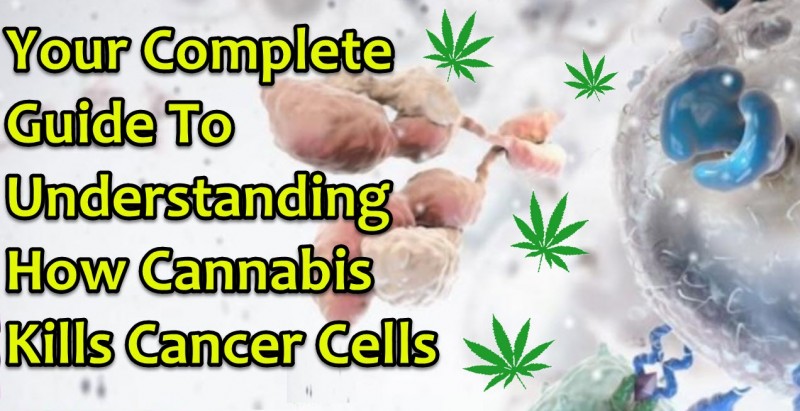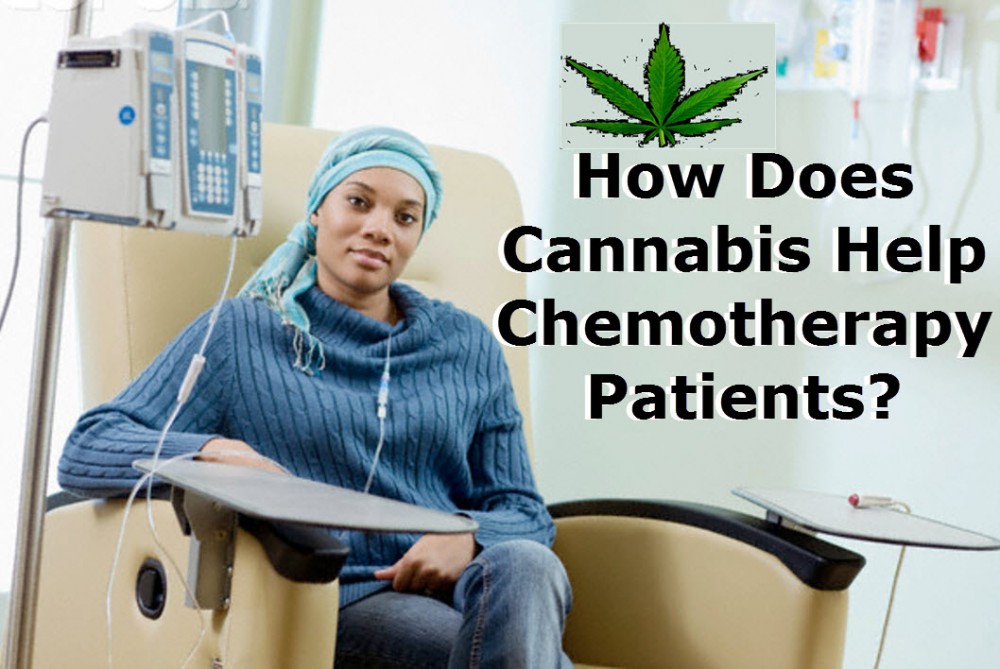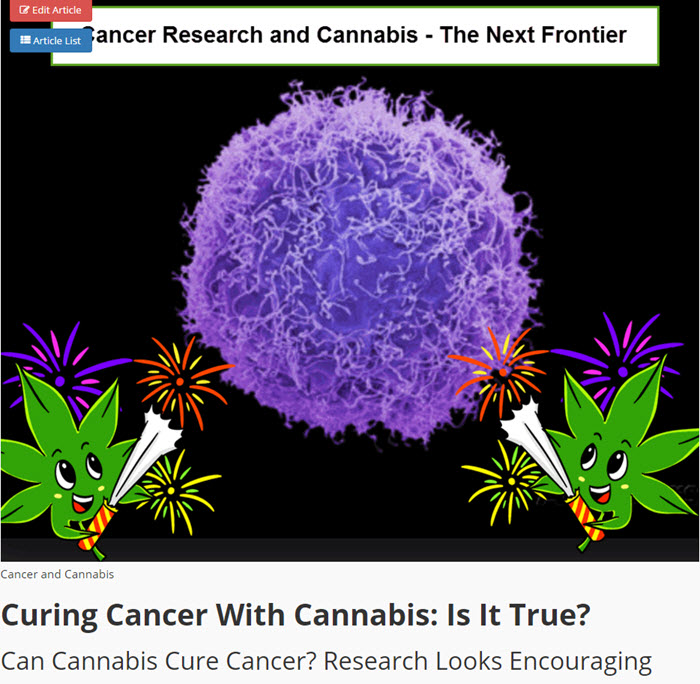How Exactly Does Cannabis Treat Cancer?
Cannabis and Cancer Cells - The Complete Guide to How Cannabis Attacks Cancer Cells from CannabisNet on Vimeo.
Your Complete Guide To Understanding How Cannabis Kills Cancer Cells
Few medical breakthroughs over the last few years are as massive as the revelation that cannabis can kill cancer.
Researchers from around the world continue studying how cannabis can treat cancer using various forms of the plant. Saying that there is genuine interest in using cannabis for cancer treatment is an understatement; it’s one that countless cancer survivors support and we have the science to back it up. In fact, you’ve probably heard a few stories yourself about how a patient has successfully used cannabis to treat cancer.
So how does cannabis kill cancer, exactly?
The truth is that cannabis doesn’t just kill cancer through one mechanism. There are many processes at play, from boosting the endocannabinoid system, treating inflammation, and strengthening the immune system. But perhaps the most well-understood and effective means by which cannabis kills cancer cells is through a process known as apoptosis.
Apoptosis
Apoptosis is a natural process that every cell goes through, even health cells. All cells have a lifespan, after which they die and expire. Health human cells die in one of two ways: necrosis, wherein external factors such as poison or infections damage the cell and stop blood supply. Apoptosis is when the cells induce death themselves, which is why it’s also known as the way that cells commit suicide.
Billions of healthy cells in your body undergo apoptosis each day, which help keep your body clean by getting rid of toxic and harmful cells. But cancer cells are a whole other ball game: the reason why cancer is such a dreadful and deadly disease is that in these types of cells, they have lost their ability to undergo apoptosis because of a genetic mutation. This is the reason why malignant cancer cells don’t just die, and they continue multiplying.
Cannabis, however, can induce apoptosis in cancer cells. It contains several compounds that can do this, including cannabinoids as well as terpenes, antioxidants, and polyphenols.
Cannabidiol (CBD), the non-psychoactive component in cannabis, is well-known for its ability to induce cancer cell death or apoptosis. In numerous cancer studies, CBD has come out as victorious in stimulating cell death; from cancers of the brain, prostate, breast, and more. Additionally, Japanese researchers have also discovered that CBD and its precursor, CBDA, helps prevent the spread of tumors on a genetic level by inhibiting the mechanisms that allow cancer cells to travel throughout the body.
And while CBD has taken up much of the limelight in the past few years for its medicinal benefits, that’s not to say that the very compound in cannabis that gets you high doesn’t have any value when it comes to cancer. Tetrahydrocannabinol (THC), also works well especially when paired with CBD in fighting cancer. One of the most well-known cases of THC treating cancer is that of Rick Simpson, the very same man who made the Rick Simpson Oil which is now being used by people for treating cancer. Simpson made his own cannabis oil using a high-THC formulation, and he was able to treat his skin cancer.
This often leads to the question: “So, do I choose CBD or THC products for cancer?” Right now, we don’t have enough research to conclusively answer this question with confidence. Much of the anecdotal information online varies; some use THC and some use CBD. There has been success; cancer has been stopped in its tracks and lives have been saved. Yet we still lack enough proof. But what we know so far when it comes to cannabinoids and cancer is that whole plant medicine is still best. CBD and THC work together, synergistically with other compounds in the plant in a process known as the entourage effect. This is the most effective way to treat a wide range of diseases including cancer, because the compounds enhance each others’ therapeutic and cancer-killing properties together with the phytonutrients and terpenes in the cannabis plant.
Autophagy
Researchers have also observed that cannabis can induce autophagy, a process wherein cells disassemble and eliminate unnecessary components. Autophagy is significant especially when tumors are involved. When there is a tumor, autophagy can either suppress its growth by preventing damaged components from accumulating, or allow the tumor cells to survive thereby promoting the growth of even more tumors.
This process in particular was observed when patients suffering from recurrent glioblastoma multiforme signed up to participate in a clinical trial designed to assess the ability of THC to treat cancer. Other studies have shown that cannabinoids can help destruct cancer cells by inducing autophagy to get rid of malignant cells in the tumors.
Chemotherapy and Radiation
Chemotherapy and radiation are two of the most commonly used conventional treatments for cancer. They are both controversial in their own rights, mainly because they often come with debilitating side effects such as nausea, vomiting, appetite loss, depression, fatigue, and insomnia – all which cannabis can help with.
However, there are certain studies that suggest combining cannabis with radiotherapy or chemotherapy for maximum benefits and for the prevention of cancer remission. Aside from cannabis helping cancer patients manage the side effects of treatment, it can also be used complementarily to improve the success rate of treatment while working together with conventional therapy in killing more cancer cells.
Not all cancer patients are open to getting high though, and this is where CBD comes in. It can be used together with chemotherapy, and some of the benefits it offers includes the treatment of cancer-related neuropathic pain, swelling, and emotional well-being.
What Cancer Patients Need To Know
There’s no way of sugar coating it: despite the fact that cannabis is more accessible than ever, the sad truth is that many sick people still can’t get a hold of it. Even those who do and need more information about cannabis as medicine to save a life, doctors are not educated enough on the subject – even those who live in states where cannabis is legal.
This has led people to choose the path of self-medication, but the most important thing you should understand is that there is no guarantee with any kind of medicine, whether that is cannabis, chemotherapy, or radiation. If you choose to reject conventional treatment and go for the all-natural route using cannabis, this may have its own risks in the same way that combining chemotherapy with cancer doesn’t have any guarantee that it would work.
If you are a cancer patient or know someone with cancer, here are some things to keep in mind if you would like to explore medicating with cannabis:
Invest a lot of time in doing your own research. The information we’ve provided you here doesn’t cover all the ground when it comes to research on cannabis for cancer. There are hundreds of studies on the topics; each with varying outcomes and many of which are positive. Regardless, if you want to use cannabis for cancer, it’s important not to go in blindly and understand everything you can so that you feel comfortable and confident in this choice. Learn about the different compounds in the cannabis plant, the various strains and their benefits, the many different methods of administering cannabis, and how the endocannabinoid system works.
Find a doctor or medical professional who is well-versed in the therapeutic benefits of cannabis for cancer. They may be hard to find especially if you live in a state that hasn’t legalized cannabis, but they’re there; especially in California, Colorado, Washington, and Oregon. If you can’t find a doctor, look for patient advocate groups online who may provide you with useful information or even refer you to a doctor near you.
Always only use natural, quality cannabis products. The market is saturated with thousands of different kinds of cannabis products, so much so that for anyone who hasn’t used it in the past, it can easily get overwhelming. Know the difference between synthetic cannabinoids such as Marinol, and pure cannabinoid and whole-plant medicine.
Investigate your sources. Cannabis is not always made equal. Knowing who and where you get your cannabis from will make a huge difference in your treatment. If you use raw cannabis flower as medicine but it has been grown with chemicals like pesticides and fertilizers, this will not do you any good especially if you are already sick. You should look for organically grown cannabis, that has been grown and processed little to no chemicals whatsoever. This goes for flower or any other cannabis-derived product.
Remember that cannabis is a part of your treatment process, and not a one-off solution. Healing from an invasive disease such as cancer requires you to make a lot of adjustments in your lifestyle, including getting enough sleep and rest, changing your diet, reducing exposure to stress, and getting some movement. All of these are critical in working with cannabis’ own healing capabilities as well as any other treatments you are using. Again, do the research and see what changes you can make to make the cannabis work for you.
Your Complete Guide To Understanding How Cannabis Kills Cancer Cells from CannabisNet on Vimeo.
OTHER STORIES YOU MAY ENJOY...
RICK SIMPSON CANCER OIL INTERVIEW, BETTER LISTEN, CLICK HERE.








